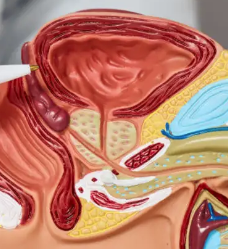Beat BPH Now: Your Essential Guide to Relief and Management
 Beat BPH Now: Your Essential Guide to Relief and Management
Beat BPH Now: Your Essential Guide to Relief and Management
Unleash Relief: A Comprehensive Guide to Battling BPH (Benign Prostatic Hyperplasia)
Let’s be honest – if you’re over 40, BPH can be a real drag. Frequent bathroom trips, a weak urine stream, and the feeling like you can never fully empty your bladder are unwelcome intruders on your quality of life. But it doesn’t have to be that way. Let’s dive into the world of BPH and discover effective ways to reclaim your life.
Understanding the Enemy: What is BPH in Medicine?
BPH stands for benign prostatic hyperplasia, a fancy term for an enlarged prostate. Imagine a walnut-sized gland at the base of your bladder, and now picture it swelling. This swelling can press against your urethra (the tube that carries urine out), making it harder to pee comfortably and completely.
BPH Interprofessional Care: Your Team for Optimal Treatment
Managing BPH effectively often involves collaboration between various healthcare professionals. Here’s a breakdown of your BPH support squad:
-
Urologist: Your BPH Battle Captain A urologist specializes in diagnosing and treating conditions of the urinary tract and male reproductive system. They’ll conduct a thorough assessment, including examining your prostate, ordering relevant tests, and tailoring a treatment plan that may include:
- Medication: Options like alpha-blockers to relax prostate muscles or 5-alpha reductase inhibitors to shrink the prostate gland.
- Minimally Invasive Procedures: These offer symptom relief with less downtime than traditional surgery.
- Surgery: In severe cases, a urologist might recommend surgery to remove part of the enlarged prostate.
-
Primary Care Physician: Your Health Quarterback Your regular doctor plays a vital role. They can conduct initial tests, screen for other conditions that might worsen urinary symptoms (like diabetes), and manage your overall well-being.
-
Pharmacist: Your Medication Expert Pharmacists are invaluable in ensuring you understand your BPH medications, how to take them correctly, potential side effects, and interactions with other drugs you may be taking.
Optional Specialists: Additional Expertise When Needed
Depending on your specific needs, other healthcare providers might join your team:
-
Physical Therapist: Specialists in pelvic floor physical therapy can teach you exercises to strengthen the muscles supporting your bladder and improve urinary control.
-
Nutritionist/Dietitian: If dietary changes are recommended to ease BPH symptoms, they can help create a personalized meal plan.
Effective Communication is Key
Open communication between you and your healthcare team is essential. Let them know about any changes in symptoms, side effects from medications, and questions you have.
You’re Not Alone in the BPH Fight
Remember, a team of dedicated professionals is ready to support you in managing BPH. Don’t hesitate to ask questions and be actively involved in your treatment plan for the best possible outcomes.
BPH Medications: Your Arsenal for Relief
When lifestyle changes and natural remedies aren’t enough to quell your frequent urination, prescription medications can offer significant relief. Let’s dive into the common types of BPH medications available:
Types of BPH Medications
-
Alpha Blockers: The Fast-Acting Solution Alpha blockers provide rapid relief by relaxing the muscles surrounding your prostate and bladder neck. This promotes a stronger urine flow and lessens that frustrating feeling of incomplete bladder emptying. Popular choices include:
- Tamsulosin (Flomax)
- Alfuzosin
- Doxazosin
- Terazosin
-
5-Alpha Reductase Inhibitors: The Long-Term Approach These medications work by blocking the production of a hormone that contributes to prostate enlargement. As a result, your prostate gradually shrinks over time. Finasteride and dutasteride are commonly prescribed 5-alpha reductase inhibitors. Keep in mind, noticeable improvement with this type of medication can take several months.
Combination Therapy: When One Medication Isn’t Enough
In some cases, your doctor might recommend combining an alpha-blocker and a 5-alpha reductase inhibitor. This dual approach can sometimes provide greater symptom relief compared to a single drug.
A Closer Look at Flomax (Tamsulosin)
Flomax, one of the most well-known alpha-blockers, is specifically designed to treat the symptoms of an enlarged prostate (BPH). It works by relaxing the smooth muscles, easing urinary flow and reducing the urge to urinate frequently.
Important Considerations Before BPH Medications
-
Talk to Your Doctor: They’ll determine the best medication for you based on your symptoms, medical history, and other medications you take.
-
Potential Side Effects: BPH medications can sometimes cause side effects like dizziness, fatigue, or changes in ejaculation. Be sure to discuss these with your doctor.
-
Monitoring: Your doctor may want to monitor your progress and check your prostate size regularly while on BPH medications.
Disclaimer: This information isn’t a substitute for professional medical advice. Always consult your physician before starting, changing, or stopping any medications.
BPH Antibiotics: When Bacteria Joins the Fight
While BPH itself isn’t an infection, sometimes pesky bacteria can make the problem worse. In cases of bacterial prostatitis (inflammation of the prostate), antibiotics offer essential relief.
Natural BPH Care: Harnessing the Power of Lifestyle
Alongside medication, try these strategies:
- Bladder Training: Stretch the time between bathroom trips.
- Double Voiding: Pee twice in quick succession to try and empty the bladder more fully.
- Fluid Management: Be mindful of drinking late at night.
- Dietary Changes: Limit caffeine, alcohol, and spicy foods (potential irritants).
- Prostate Supplements: Nature has an arsenal full of natural supplements that can aid immensely in your prostate’s battle for survival
Beyond the Basics: Other BPH Treatments to Consider
When medications and lifestyle adjustments aren’t enough, more advanced options exist. Talk to your doctor about:
- Minimally invasive procedures: These offer various ways to remove or reduce prostate tissue.
- Surgery: For severe BPH there are different traditional surgical routes.
Take Control: Don’t Let BPH Dictate Your Life
BPH, while frustrating, is manageable. Be proactive, talk to your doctor, explore your options, and don’t be afraid to ask questions. You deserve a life uninterrupted by bathroom anxieties. This guide is just the beginning – let your journey to relief continue!
FAQs to Conquer Your BPH Concerns
 FAQ 1. Is there a link between BPH and prostate cancer?
FAQ 1. Is there a link between BPH and prostate cancer?
While having BPH doesn’t directly cause prostate cancer, they can sometimes happen together. Stay vigilant with regular checkups to catch any potential problems early.
FAQ 2. How fast can I expect relief from BPH medications?
The speed depends on the medication. Alpha blockers may provide noticeable improvement quite quickly, while other medications might take longer to show their full effects.
FAQ 3. Are there any side effects to be aware of with BPH treatments?
Yes, all medications have potential side effects. Discuss the specific risks and benefits of each medication with your doctor to make informed decisions.
FAQ 4. Can I try natural remedies to help manage my BPH?
Absolutely! Simple strategies like bladder training, fluid management, and dietary changes and prostate supplements may offer additional relief alongside your other BPH treatments.
FAQ 5. What if medication and lifestyle changes don’t cut it?
Don’t despair! Your doctor can discuss a range of minimally invasive procedures or surgical options if needed to achieve significant relief from severe BPH.
SEE ALSO: Latest Prostate Supplements >>

